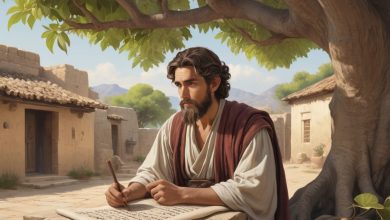Belief in the Revealed Books (Iman bil-Kutub) in Islam

Islam, as one of the major world religions, places a significant emphasis on the belief in the revealed books, known as Iman bil-Kutub. These scriptures are believed to be the divine messages sent by Allah (God) to guide humanity in matters of faith, morality, and the path to salvation. For Muslims, the belief in these books is one of the fundamental tenets of their faith, forming an essential part of the broader concept of Iman (faith). In this article, we will explore the importance of believing in the revealed books in Islam, focusing on their role in guiding human beings and the crucial influence they have on Muslim identity and spirituality.
Overview of the Revealed Books

The Revealed Books in Islam are a series of sacred scriptures that were sent by Allah to different prophets throughout history. Each of these books was revealed to provide divine guidance to the people of their respective times. Muslims believe that these scriptures are the direct word of God and that they serve as a light for those who seek righteousness, justice, and spiritual enlightenment.
The key revealed books in Islam are:
- The Qur’an – The final and most complete scripture revealed to Prophet Muhammad (PBUH).
- The Torah (Tawrat) – Revealed to Prophet Musa (Moses).
- The Psalms (Zabur) – Revealed to Prophet Dawud (David).
- The Gospel (Injil) – Revealed to Prophet Isa (Jesus).
These books are considered integral to the foundation of Islamic belief, and their teachings, though distinct, all emphasize the worship of one God (Allah) and the principles of righteousness.
The Importance of the Qur’an

Among the revealed books, the Qur’an holds a special place in Islam as it is regarded as the final revelation from Allah. Muslims believe that the Qur’an is the literal word of God, revealed over a period of approximately 23 years to the Prophet Muhammad (PBUH) through the Angel Jibreel (Gabriel).
The Qur’an is viewed as the complete and unaltered message of God, guiding humanity on matters of belief, worship, law, morality, and daily conduct. It is seen not just as a scripture, but as a comprehensive way of life, offering both spiritual wisdom and practical solutions for the problems faced by society. As the last divine book, the Qur’an is considered the final, universal, and timeless message, superseding all previous scriptures. It is preserved in its original language, Arabic, and Muslims believe that it will remain unchanged until the Day of Judgment.
The Qur’an is central to the daily lives of Muslims. It is recited in prayer (Salah), studied for spiritual growth, and followed as the primary guide for all aspects of life. Its messages of peace, justice, mercy, and compassion resonate with Muslims around the world, and it serves as a reminder of the omnipresence of Allah’s guidance.
Other Holy Scriptures in Islam

While the Qur’an holds a unique position in Islam, there are other revealed scriptures that are highly respected and form part of the belief system of a Muslim. These books are believed to have been revealed before the Qur’an, and they share common themes, such as the oneness of God, the importance of justice, and the necessity of moral uprightness.
The Torah (Tawrat)
The Torah is the holy scripture that was revealed to Prophet Musa (Moses). It is one of the most significant books in the Abrahamic traditions and is believed to have contained the laws and commandments given by God to the people of Israel. The Torah provided guidance on matters of law, ethics, and morality, similar to how the Qur’an provides guidance for Muslims today.
In Islam, it is believed that while the original Torah was divinely inspired, over time it was altered and distorted by human intervention. Nevertheless, the fundamental message of the Torah — the worship of one God and adherence to His commandments — remains integral to Islamic belief.
The Psalms (Zabur)
The Psalms were revealed to Prophet Dawud (David) and are considered a collection of divine songs, prayers, and wisdom. The Zabur is often viewed in Islam as a source of solace, praise, and devotion to Allah. It is similar in some respects to the psalms found in the Bible, though the Islamic belief holds that only a portion of the original Psalms has been preserved in its purest form.
The teachings of the Zabur emphasize humility, gratitude, and submission to Allah. Like the other revealed books, the Psalms were intended to guide their followers in worship and in leading a righteous life.
The Gospel (Injil)
The Gospel, known as the Injil in Islam, was revealed to Prophet Isa (Jesus). The Gospel, in its original form, is considered to have been a message of guidance, peace, and wisdom, calling people to worship one God and to live a life of piety and charity. Muslims believe that Jesus was a prophet of Allah, and the Gospel he received was a divine revelation for his time and people.
However, similar to the Torah and Psalms, the Gospel has been subject to alterations, and Muslims believe that the true message of the Injil was distorted. Despite this, the teachings of Jesus, especially his emphasis on compassion, mercy, and love for others, are highly revered in Islam.
How Belief in These Books Shapes Muslim Faith

Iman bil-Kutub, or the belief in the revealed books, is one of the six pillars of Iman (faith) in Islam. This belief is central to a Muslim’s understanding of the relationship between humanity and God. By affirming the divine origin of these scriptures, Muslims recognize that Allah has always provided humanity with guidance through His chosen messengers.
Belief in these books is also a unifying factor for Muslims, as it connects them not only to their own faith but to the broader Abrahamic tradition. Muslims believe that all the prophets and their scriptures were sent by the same God to guide humanity, and thus, a Muslim respects all the previous books and their messengers. This fosters respect and understanding of other faiths that share these common foundations.
Furthermore, belief in the revealed books shapes how Muslims view the world. It provides them with a sense of purpose, a clear ethical framework, and a roadmap for achieving success in both this life and the hereafter. The teachings from the Qur’an, Torah, Psalms, and Gospel help Muslims live in accordance with God’s will, promoting justice, mercy, kindness, and humility.
Conclusion
The belief in the revealed books in Islam is not just a theological concept but an essential part of the Muslim faith. It reinforces the idea that Allah has always been with humanity, offering guidance through His prophets and their respective scriptures. These sacred books — the Qur’an, Torah, Psalms, and Gospel — serve as beacons of light, leading individuals to righteousness, spiritual fulfillment, and a deeper connection with the divine.
For Muslims, belief in the revealed books is a recognition of the continuity and unity of God’s message throughout history. It calls them to uphold the teachings of these books, respect their commonalities, and strive for a life of faith, justice, and compassion. Ultimately, the Iman bil-Kutub serves as a reminder of the divine wisdom that has been revealed to guide humanity, and it remains central to the Muslim worldview and practice.




